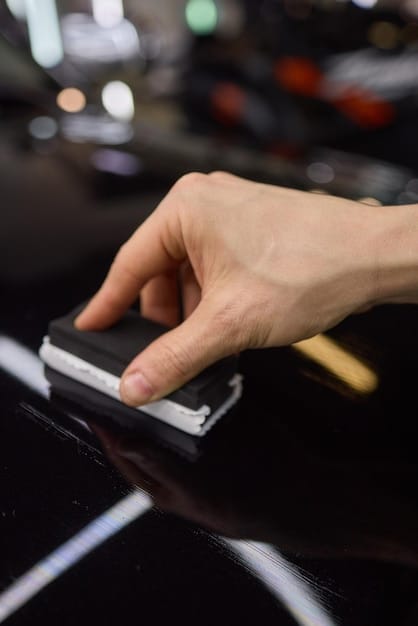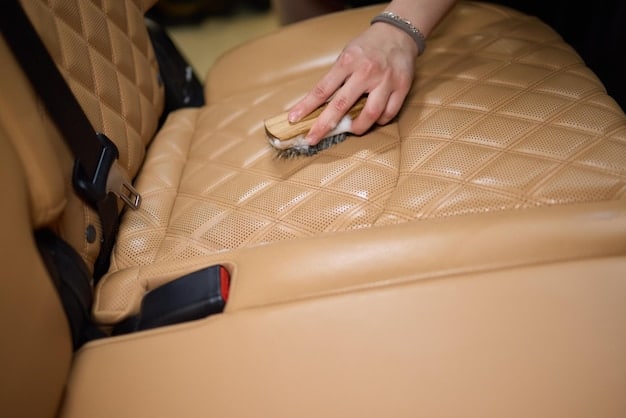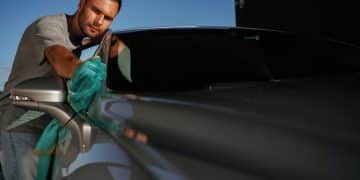New Car Detailing: Why It’s Crucial in the First 3 Months

New car detailing during the first three months is crucial to protect the vehicle’s paint, interior, and overall value by preventing early damage from environmental factors and daily use.
So, you’ve just bought a new car – congratulations! That fresh car smell, the pristine interior, and the gleaming paint job are all part of the excitement. But did you know that the first three months of ownership are the most critical for preserving your car’s appearance and value? That’s where new car detailing comes in. Ignoring detailing in these initial months can lead to premature wear and tear, diminishing that showroom shine faster than you think. Keep reading to know why this matter so much!
New Car Detailing: Understanding the Basics
Before diving into why it’s crucial, let’s clarify what new car detailing involves. It’s more than just a regular car wash; it’s a comprehensive process to protect and preserve your vehicle’s condition. This includes paint protection, interior care, and attention to often-overlooked areas. Understanding the basics helps you appreciate the long-term benefits.
What Does New Car Detailing Include?
New car detailing generally encompasses several key services to ensure your vehicle remains in top shape. It’s a preventative measure against the elements and daily wear.
- Paint Protection: Applying sealants or ceramic coatings to shield the paint from UV rays, road salts, and environmental pollutants.
- Interior Protection: Conditioning leather, protecting fabrics, and applying UV protectants to prevent fading and cracking.
- Wheel and Tire Care: Cleaning and protecting wheels from brake dust and applying tire dressings to maintain their appearance.
- Glass Treatment: Applying water repellents to windows and windshields for improved visibility and protection from water spots.
New car detailing focuses on preserving the factory finish and preventing damage before it starts. It’s an investment in your car’s long-term beauty and value.

Why the First 3 Months Matter Most
The first three months are particularly important because new cars are most vulnerable during this period. The factory paint is still curing, and the interior materials are susceptible to damage from UV exposure and daily use. Taking proactive measures can make a significant difference.
Environmental Factors
New cars face a barrage of environmental threats right from the start. These factors can degrade the paint and interior if left unprotected.
- UV Rays: Can cause the paint to fade and interior plastics and fabrics to crack and discolor.
- Acid Rain: Can etch into the clear coat, leaving permanent marks.
- Road Salts: During winter, can corrode the undercarriage and lower body panels.
- Tree Sap and Bird Droppings: Highly acidic and can damage the paint if not removed quickly.
Protecting your car early on shields it from these harmful elements. Regular detailing helps maintain the car’s appearance and prevent costly repairs down the road. Ignoring these factors can lead to long-term damage.
Benefits of New Car Detailing
Investing in new car detailing offers numerous benefits, both immediate and long-term. It not only keeps your car looking its best but also protects your investment.
Preserving the Paint
The paint is one of the first things people notice about a car. Protecting it from scratches and fading is essential.
Applying a quality sealant or ceramic coating can create a barrier against scratches, swirl marks, and fading caused by UV rays. This protection ensures that your car maintains its showroom shine for years to come. This is a key part of ensuring new car detailing is worth the cost.
Maintaining Interior Condition
The interior also benefits greatly from detailing. Proper care can prevent wear and tear on the seats, dashboard, and other surfaces.
Conditioning the leather or fabric seats prevents them from drying out and cracking. Applying UV protectants to the dashboard and other plastic surfaces can prevent discoloration and fading. These steps keep the interior looking and feeling new for longer.

DIY vs. Professional Detailing
You might wonder whether to detail your new car yourself or hire a professional. Both options have their pros and cons, and the best choice depends on your budget, skills, and time.
DIY Detailing
DIY detailing can be a cost-effective option for maintaining your car. However, it requires time, effort, and the right products.
- Cost Savings: You only pay for the products you use, which can save money compared to professional services.
- Flexibility: You can detail your car on your own schedule and at your own pace.
- Learning Opportunity: It’s a chance to learn more about car care and develop a new skill.
However, DIY detailing can also be time-consuming, and using the wrong products or techniques can cause damage. If you’re unsure, it’s often best to leave it to the professionals.
Professional Detailing
Professional detailing offers expertise and quality results. While it’s more expensive, it can be a worthwhile investment.
- Expertise: Professionals have the knowledge and experience to use the right products and techniques for your car.
- Quality Results: They can achieve a higher level of cleanliness and protection than most DIYers.
- Time Savings: You save time and effort by letting someone else handle the detailing.
Choosing a professional detailer ensures that your car receives the best possible care. They can identify potential problems and address them effectively. This can be particularly important for maintaining your car’s value.
Tips for Maintaining Your New Car’s Detail
Once you’ve detailed your new car, maintaining its condition is crucial. Regular maintenance can extend the life of your detailing and keep your car looking its best.
Regular Washing
Washing your car regularly removes dirt, grime, and pollutants that can damage the paint. Aim for weekly washes to keep your car clean.
Use a pH-balanced car wash soap and a soft microfiber mitt to avoid scratching the paint. Rinse thoroughly and dry with a clean microfiber towel. This simple step can prevent the buildup of contaminants and protect your car’s finish.
Quick Spot Cleaning
Address spills, bird droppings, and other messes as soon as possible to prevent staining and damage. Keep a detailing spray and microfiber towels in your car for quick cleanups.
Promptly cleaning up messes prevents them from setting in and causing lasting damage. This is especially important for upholstery and carpets, where stains can be difficult to remove.
| Key Point | Brief Description |
|---|---|
| 🛡️ Paint Protection | Applying sealants to protect from UV rays and pollutants. |
| ☀️ Interior Care | Conditioning leather to prevent cracking and fading. |
| ✨ Regular Washing | Weekly washes to remove dirt and protect the paint. |
| 💧 Glass Treatment | Using water repellents to improved visibility. |
Frequently Asked Questions
New car detailing protects your vehicle from environmental damage, preserves its appearance, and increases its resale value. It addresses vulnerabilities in the early months of ownership.
For the first three months, consider a professional detailing service. Afterward, a regular wash every 1-2 weeks and a professional detail every 6-12 months is recommended.
No, regular household cleaners can be too harsh and damage your car’s interior surfaces. Use car-specific interior cleaners and protectants.
Waxing provides a temporary shine and protection, needing reapplication every few months. Ceramic coating offers longer-lasting protection and enhanced durability, lasting several years.
Yes, maintaining your car’s appearance through detailing can significantly improve its resale value. A well-maintained car is more attractive to potential buyers.
Conclusion
New car detailing in the first three months of ownership is an investment that pays off in the long run. By taking proactive steps to protect your vehicle, you can preserve its appearance, prevent costly repairs, and maintain its value. Whether you choose DIY or professional detailing, the key is to start early and stay consistent.
“





